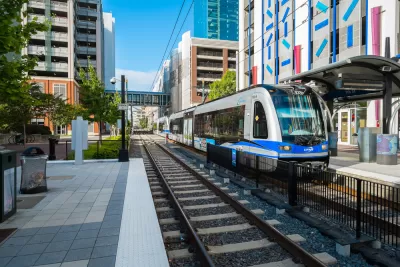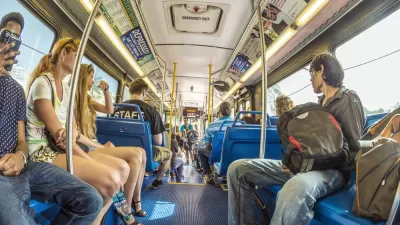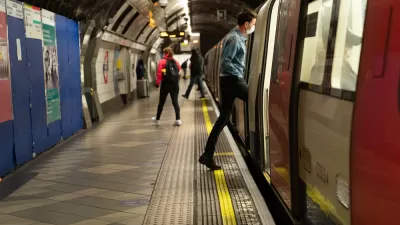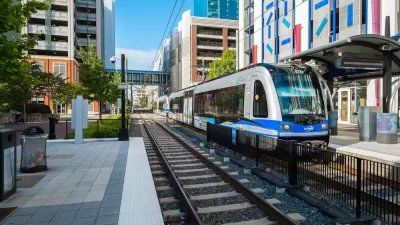The agency's CEO says the system needs more funding to make service improvements and make the shift to an electrified fleet.

With transportation making up 40 percent of the Charlotte region's carbon emissions, the local transit agency is calling for a sales tax increase to fund more sustainable transit and encourage a mode shift to its rail and bus services.
As David Boraks reports, the head of the Charlotte Area Transit System (CATS), along with other city leaders, has proposed a 1-cent sales tax increase that would fund Charlotte's mobility network. The agency wants to improve service frequency, buy an additional 100 buses, and hire more operators and mechanics. "At the moment, the system remains hobbled by the coronavirus pandemic. Ridership is stagnant and worse, CATS is facing staff shortages due to illness as well as a high number of vacancies in existing positions."
CATS CEO JOhn Lewis highlighted the importance of getting more people to ride buses and trains: "We're doing things, where we're converting our fleet to electric buses. And we can talk about that if you want. But the best thing that we can do to help is to have a system that is so reliable that people want to get out of their cars."
The proposal faces doubts from some local communities who worry they won't benefit and may not reach the ballot this November.
FULL STORY: Public transit is a climate change tool, but CATS chief says he needs funding to make it better

Study: Maui’s Plan to Convert Vacation Rentals to Long-Term Housing Could Cause Nearly $1 Billion Economic Loss
The plan would reduce visitor accommodation by 25,% resulting in 1,900 jobs lost.

North Texas Transit Leaders Tout Benefits of TOD for Growing Region
At a summit focused on transit-oriented development, policymakers discussed how North Texas’ expanded light rail system can serve as a tool for economic growth.

Why Should We Subsidize Public Transportation?
Many public transit agencies face financial stress due to rising costs, declining fare revenue, and declining subsidies. Transit advocates must provide a strong business case for increasing public transit funding.

How to Make US Trains Faster
Changes to boarding platforms and a switch to electric trains could improve U.S. passenger rail service without the added cost of high-speed rail.

Columbia’s Revitalized ‘Loop’ Is a Hub for Local Entrepreneurs
A focus on small businesses is helping a commercial corridor in Columbia, Missouri thrive.

Invasive Insect Threatens Minnesota’s Ash Forests
The Emerald Ash Borer is a rapidly spreading invasive pest threatening Minnesota’s ash trees, and homeowners are encouraged to plant diverse replacement species, avoid moving ash firewood, and monitor for signs of infestation.
Urban Design for Planners 1: Software Tools
This six-course series explores essential urban design concepts using open source software and equips planners with the tools they need to participate fully in the urban design process.
Planning for Universal Design
Learn the tools for implementing Universal Design in planning regulations.
Ascent Environmental
Borough of Carlisle
Institute for Housing and Urban Development Studies (IHS)
City of Grandview
Harvard GSD Executive Education
Toledo-Lucas County Plan Commissions
Salt Lake City
NYU Wagner Graduate School of Public Service





























